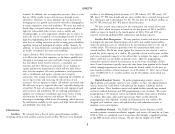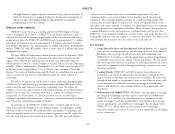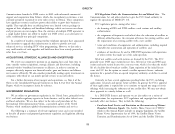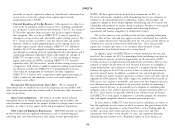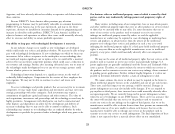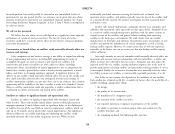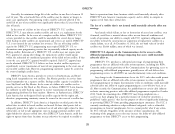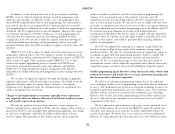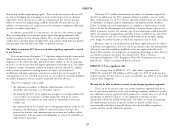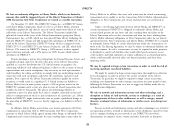DIRECTV 2012 Annual Report Download - page 38
Download and view the complete annual report
Please find page 38 of the 2012 DIRECTV annual report below. You can navigate through the pages in the report by either clicking on the pages listed below, or by using the keyword search tool below to find specific information within the annual report.DIRECTV
particular, we may be required to submit to ‘‘baseball style’’ arbitration if we MVPDs. We have agreed with the Federal Trade Commission, or FTC, to
cannot arrive at terms for carriage of our regional sports network (1) review and monitor compliance with telemarketing laws by any companies we
programming with an MVPD. authorize to do telemarketing and by independent retailers, (2) investigate and
respond to complaints about alleged improper telemarketing and (3) terminate our
•Potential Regulation of Set-Top Receivers. Cable operators are subject to a relationship with marketers or retailers found in violation. Similarly, we have agreed
wide variety of regulation of their set-top receivers, including a prohibition with certain state attorneys general to comply with advertising disclosure
on ‘‘integrated’’ security and non-security functions. The FCC has exempted requirements and monitor compliance by independent retailers.
DTH satellite operators from such rules, but has been urged to eliminate
that exemption. Were it to do so, DIRECTV U.S. may be required to We are also subject to state and federal rules and laws regarding information
redesign its set-top receivers and, conceivably, replace existing receivers. The security. Most of these rules and laws apply to customer information that could be
D.C. Circuit recently vacated FCC rules that limited cable and satellite used to commit identity theft. Substantially all of the U.S. states and the District of
operators’ ability to encode programming to restrict copying and to use Columbia have enacted security breach notification laws. These laws generally
selectable output control, which could give DIRECTV U.S. additional require that a business give notice to its customers whose financial account
flexibility. The FCC has adopted accessibility requirements, such as the information has been disclosed because of a security breach.
pass-through or rendering of closed captioning and video description, and is In addition, aspects of DBS/DTH service remain regulated at the state and
considering additional requirements which could require the redesign of local level. For example, the FCC has promulgated rules prohibiting restrictions by
DIRECTV’s set-top receivers. The FCC is also considering an alternate local government agencies and private organizations on the placement of DBS
regime under which all MVPDs, including DIRECTV U.S, would be receiving antennas. Local governments and homeowners associations, however, may
required to offer ‘‘All Vid interfaces’’ instead of their existing set-top receiver continue to regulate the placement of such antennas if necessary to accomplish a
arrangements. Such interfaces would be designed according to government clearly defined public safety objective or to preserve a recognized historic district,
specifications to deliver the DIRECTV U.S. programming stream and and may also apply to the FCC for a waiver if there are other local concerns of a
related data for manipulation by third-party electronic equipment. special or unusual nature. In addition, a number of state and local governments
DIRECTV U.S. believes such a requirement would significantly hinder its have attempted to impose consumer protection, customer service and other types of
ability to offer new and innovative services, and could complicate its regulation on DBS operators. Also, while Congress has prohibited local taxation of
customer service efforts. DBS service, state taxation is permissible, and many states have imposed such taxes,
and additional states have attempted to do so recently. Incident to conducting a
International Telecommunications Union Rules. We are required by
consumer directed business, we occasionally receive inquiries or complaints from
international rules to coordinate the use of the frequencies on our satellites with
authorities such as state attorneys general and state consumer protection offices or
other satellite operators who may interfere with us or who may suffer interference
the FTC. These matters are generally resolved in the ordinary course of business,
from our operations.
and DIRECTV recently agreed to implement a restitution program for consumers
Export Control Regulation. The delivery of satellite-related technical who send eligible complaints related to consumer protection practices.
information for use by foreign manufacturing companies and of satellites and In Latin America, DIRECTV Latin America and its subsidiaries are subject to
related technical information for the purpose of launch by foreign launch services laws and regulations in each country in which we operate that govern many of the
providers are subject to strict export control and prior approval requirements. same aspects of our operations as in the United States, such as landing rights for
Other Legal and Regulatory Requirements. DBS/DTH providers are subject satellites; spectrum, earth station and other licenses; must carry and other
to other federal and state regulatory requirements, such as telemarketing and requirements with respect to the channels we carry; and regulations governing
advertising rules, and subscriber privacy rules similar to those governing other telemarketing and customer service. Regulatory regimes in Latin America are
18


